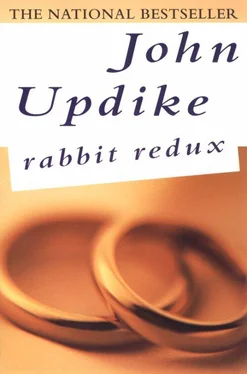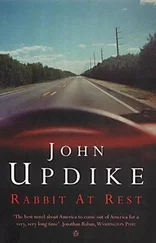Nelson squeezes out in the spaces between his sobs. "Daddy, why do you disagree with everybody?"
"Because I love my country and can't stand to have it knocked."
"If you loved it you'd want it better," Jill says.
"If it was better I'd have to be better," he says seriously, and they all laugh, he last.
Thus, through lame laughter – she still rubs her wrists, the hand he hit her with begins to hurt – they seek to reconstitute their family. For supper Jill cooks a filet of sole, lemony, light, simmered in sunshine, skin flaky brown; Nelson gets a hamburger with wheatgerm sprinkled on it to remind him of a Nutburger. Wheatgerm, zucchini, water chestnuts, celery salt, Familia: these are some of the exotic items Jill's shopping brings into the house. Her cooking tastes to him of things he never had: candlelight, saltwater, health fads, wealth, class. Jill's family had a servant, and it takes her some nights to understand that dirtied dishes do not clear and clean themselves by magic, but have to be carried and washed. Rabbit, still, Saturday mornings, is the one to vacuum the rooms, to bundle his shirts and the sheets for the laundry, to sort out Nelson's socks and underwear for the washer in the basement. He can see, what these children cannot, dust accumulate, deterioration advance, chaos seep in, time conquer. But for her cooking he is willing to be her servant, part-time. Her cooking has renewed his taste for life. They have wine now with supper, a California white in a half-gallon jug. And always a salad: salad in Diamond County cuisine tends to be a brother of sauerkraut, fat with creamy dressing, but Jill's hands serve lettuce in an oily film invisible as health. Where Janice would for dessert offer some doughy goodie from the Half-A-Loaf, Jill concocts designs of fruit. And her coffee is black nectar compared to the watery tar Janice used to serve. Contentment makes Harry motionless; he watches the dishes be skimmed from the table, and resettles expansively in the living room. When the dishwashing machine is fed and chugging contentedly, Jill comes into the living room, sits on the tacky carpet, and plays the guitar. What does she play? "Farewell, Angelina, the sky is on fire," and a few others she can get through a stanza of. She has maybe six chords. Her fingers on the frets often tighten on strands of her hanging hair; it must hurt. Her voice is a thin instrument that quickly cracks. "All my tri-als, Lord, soon be o-over," she sings, quitting, looking up for applause.
Nelson applauds. Small hands.
"Great," Rabbit tells her and, mellow on wine, goes on, in apology for his life, "No kidding, I once took that inner light trip and all I did was bruise my surroundings. Revolution, or whatever, is just a way of saying a mess is fun. Well, it is fun, for a while, as long as somebody else has laid in the supplies. A mess is a luxury, is all I mean."
Jill has been strumming for him, between sentences, part helping him along, part poking fun. He turns on her. "Now you tell us something. You tell us the story of your life."
"I've had no life," she says, and strums. "No man's daughter, and no man's wife."
"Tell us a story," Nelson begs. From the way she laughs, showing her roundish teeth and letting her thin cheeks go dimply, they see she will comply.
"This is the story of Jill and her lover who was ill," she announces, and releases a chord. It's as if, Rabbit thinks, studying the woman-shape of the guitar, the notes are in there already, waiting to fly from the dovecote of that round hole. "Now Jill," Jill goes on, "was a comely lass, raised in the bosom of the middle class. Her dad and mother each owned a car, and on the hood of one was a Mercedes star. I don't know how much longer I can go on rhyming." She strums quizzically.
"Don't try it," Rabbit advises.
"Her upbringing" – emphasis on the "ging" – "was orthodox enough – sailing and dancing classes and francais and all that stuff."
"Keep rhyming, Jill," Nelson begs.
"Menstruation set in at age fourteen, but even with her braces off Jill was no queen. Her knowledge of boys was confined to boys who played tennis and whose parents with her parents dined. Which suited her perfectly well, since having observed her parents drinking and chatting and getting and spending she was in no great hurry to become old and fat and swell. Ooh, that was a stretch."
"Don't rhyme on my account," Rabbit says. "I'm getting a beer, anybody else want one?"
Nelson calls, "I'll share yours, Dad."
"Get your own. I'll get it for you."
Jill strums to reclaim their attention. "Well, to make a boring story short, one summer" – she searches ahead for a rhyme, then adds, "after her daddy died."
"Uh-oh," Rabbit says, tiptoeing back with two beers.
"She met a boy who became her psycho-physical guide."
Rabbit pulls his tab and tries to hush the pff.
"His name was Freddy -"
He sees there is nothing to do but yank it, which he does so quickly the beer foams through the keyhole.
"And the nicest thing about him was that she was ready." Strum. "He had nice brown shoulders from being a lifeguard, and his bathing suit held something sometimes soft and sometimes hard. He came from far away, from romantic Rhode Island across Narragansett Bay."
"Hey," Rabbit olés.
"The only bad thing was, inside, the nice brown lifeguard had already died. Inside there was an old man with a dreadful need, for pot and hash and LSD and speed." Now her strumming takes a different rhythm, breaking into the middle on the offbeat.
"He was a born loser, though his race was white, and he fucked sweet virgin Jill throughout one sandy night. She fell for him" strum – "and got deep into his bag of being stoned: she freaked out nearly every time the bastard telephoned. She went from popping pills to dropping acid, then" – she halts and leans forward staring at Nelson so hard the boy softly cries, "Yes?"
"He lovingly suggested shooting heroin."
Nelson looks as if he will cry: the way his eyes sink in and his chin develops another bump. He looks, Rabbit thinks, like a sulky girl. He can't see much of himself in the boy, beyond the small straight nose.
The music runs on.
"Poor Jill got scared; the other kids at school would tell her not to be a self-destructive fool. Her mother, still in mourning, was being kept bus-ee, by a divorced tax lawyer from nearby Westerlee. Bad Freddy was promising her Heaven above, when all Jill wanted was his mundane love. She wanted the feel of his prick, not the prick of the needle; but Freddy would beg her, and stroke her, and sweet-talk and wheedle."
And Rabbit begins to wonder if she has done this before, that rhyme was so slick. What hasn't this kid done before?
"She was afraid to die" – strum, strum, pale orange hair thrashing – "he asked her why. He said the world was rotten and insane; she said she had no cause to complain. He said racism was rampant, hold out your arm; she said no white man but him had ever done her any harm. He said the first shot will just be beneath the skin; she said okay, lover, put that shit right in." Strum strum strum. Face lifted toward them, she is a banshee, totally bled. She speaks the next line. "It was hell."
St-r-r-um. "He kept holding her head and patting her ass, and saying relax, he'd been to life-saving class. He asked her, hadn't he shown her the face of God? She said, Yes, thank you, but she would have been happy to settle for less. She saw that her lover with his tan skin and white smile was death; she feared him and loved him with every frightened breath. So what did Jill do?"
Silence hangs on the upbeat.
Nelson blurts, "What?"
Jill smiles. "She ran to the Stonington savings bank and generously withdrew. She hopped inside her Porsche and drove away, and that is how come she is living with you two creeps today."
Читать дальше












